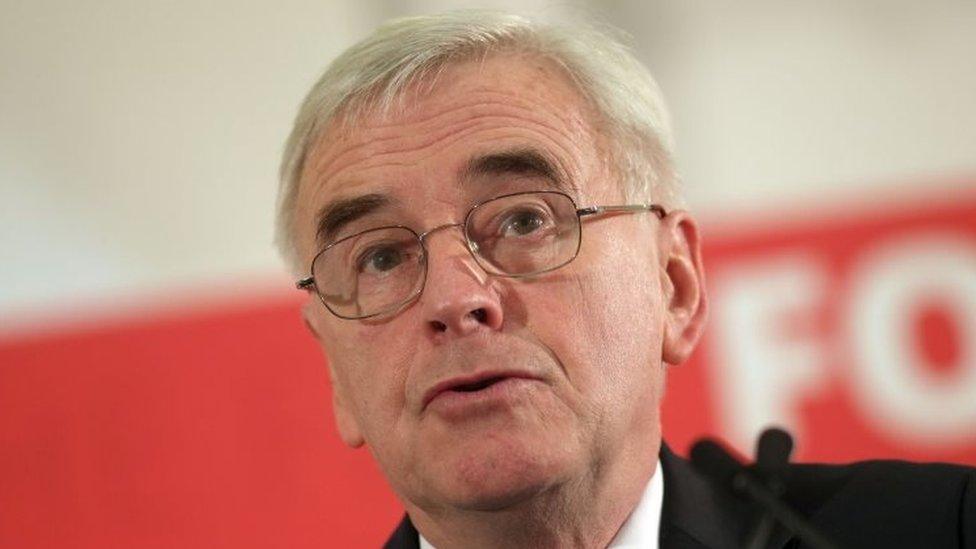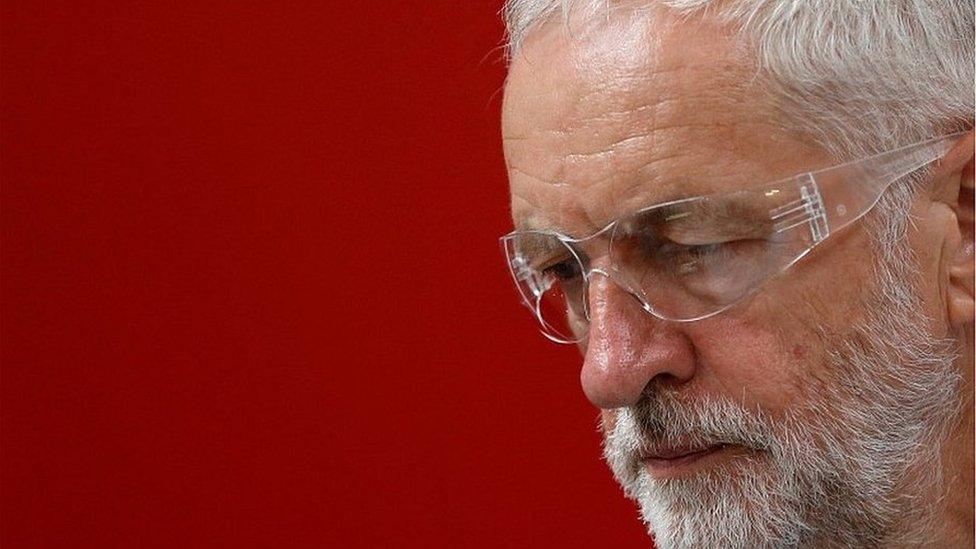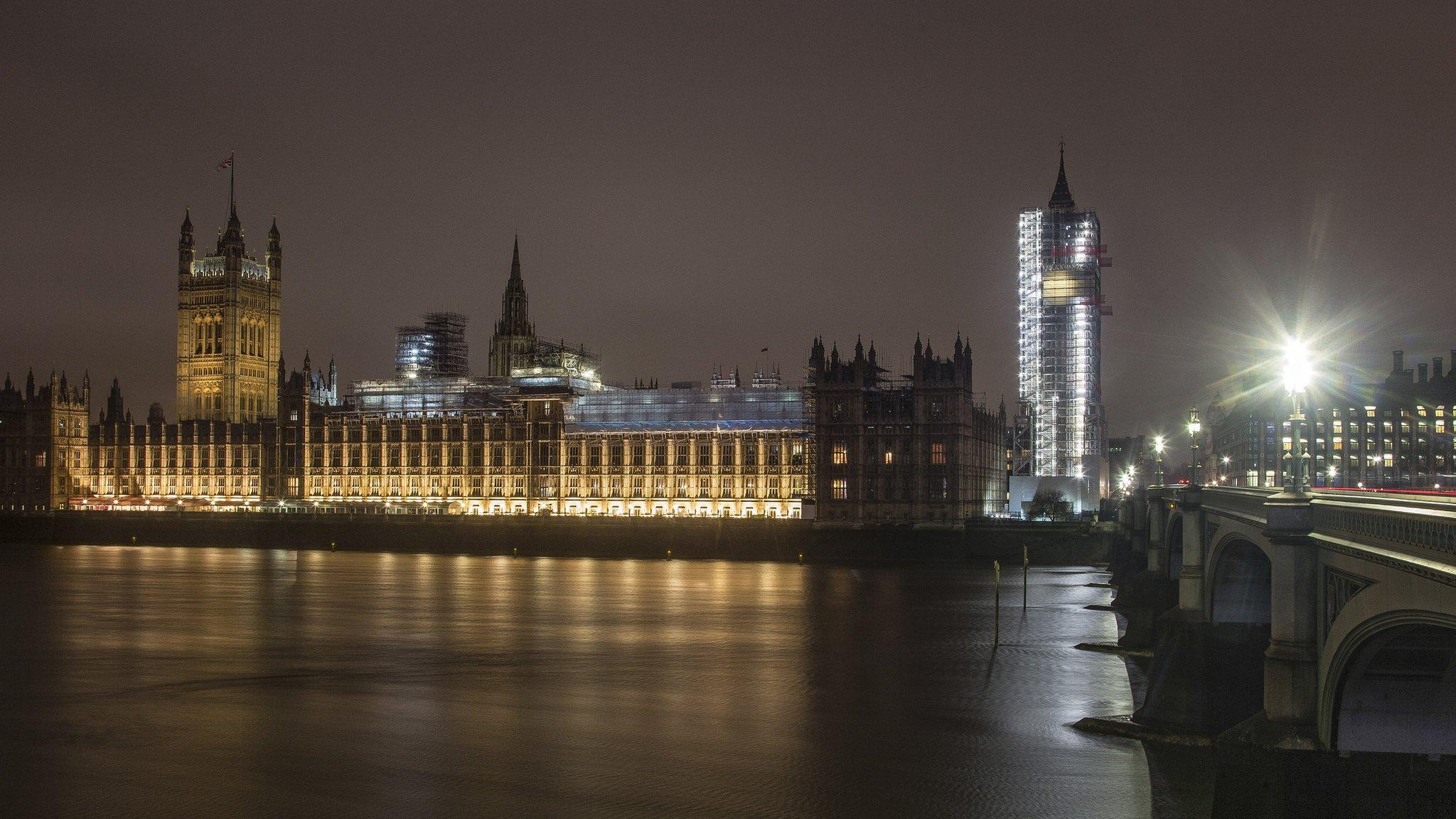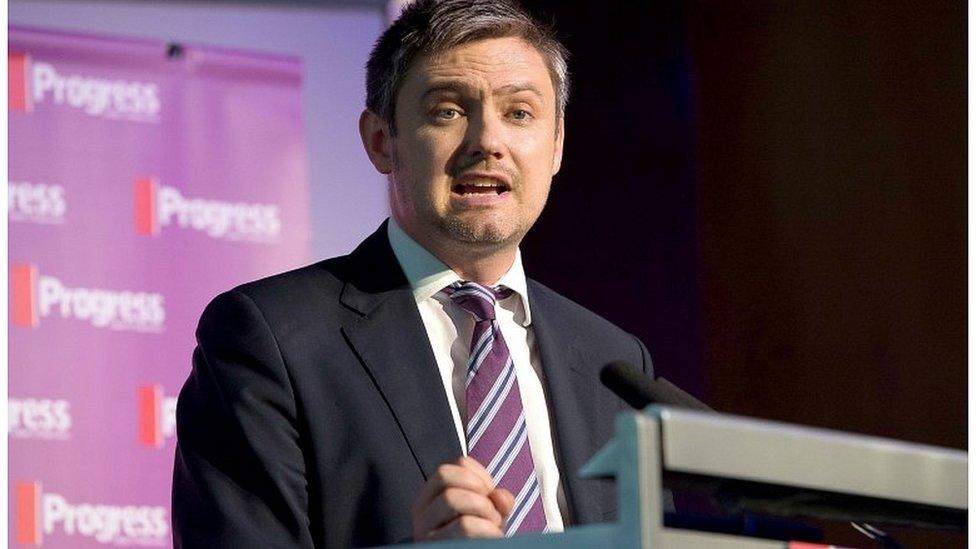Anti-Semitism row: Frank Field resigns Labour whip
- Published
Field: We must deal with 'local Labour thuggery'
Veteran Labour MP Frank Field has quit the party's group in Parliament, saying the leadership is becoming "a force for anti-Semitism in British politics".
The Birkenhead MP also blamed a "culture of intolerance, nastiness and intimidation" in local parties.
A month ago he lost a confidence vote in his constituency party, after siding with the government in Brexit votes.
Jeremy Corbyn has apologised for hurt caused by anti-Semitism in the party and pledged to stamp it out.
A Labour Party spokesman said: "Jeremy Corbyn thanks Frank Field for his service to the Labour Party."
But a Labour source claimed "Frank has been looking for an excuse to resign for some time."
Mr Field, a Eurosceptic who is among a handful of Labour MPs to back the government in some Brexit votes, says he will remain as a member of the party, but will quit the Labour whip in Parliament - which means he will not be subject to the parliamentary party's disciplinary procedures.
The Labour Party says it is not possible to resign the whip and remain a party member, but Mr Field told BBC Radio 4's PM he hoped to stand as a Labour candidate at the next election, but would otherwise stand as an independent Labour candidate.
Birkenhead voters react to local MP Frank Field's decision to resign the Labour whip
In a letter to chief whip Nick Brown, he said the anti-Semitism row in the party was reason enough to resign, suggesting the leadership was "becoming a force for anti-Semitism in British politics".
"The leadership is doing nothing substantive to address this erosion of our core values. It saddens me that we are increasingly seen as a racist party."
Mr Field has been a Labour MP since 1979 and is a specialist on welfare issues. He had a spell as welfare reform minister after Tony Blair became prime minister in 1997, but his brief to "think the unthinkable" ended with his resignation a year later.
Since then he has been a backbencher, and has chaired the Commons Work and Pensions Committee for the past three years.


Mr Field said he expected Jeremy Corbyn to lead the party into the next election
Analysis, by John Pienaar, BBC deputy political editor
Perhaps the biggest question raised by Frank Field's resignation from Labour's group at Westminster is: Will there be more?
Could this even be the beginning of a much wider schism, taking some of the significant minority of Labour MPs who oppose Jeremy Corbyn, not just over the issue of anti-Semitism but wider political issues including Europe, over the edge?
The stresses and strains in the party over anti-Semitism, over Europe and in particular the idea of a fresh referendum - a so-called People's Vote - on Brexit will dominate Labour's annual conference in Liverpool in late September.
Talk of a new centrist grouping in politics has been rumbling for months. But those dissident MPs have, so far, been deeply reluctant to translate their private dissent into open insurrection.
They say it's about deep-rooted loyalty. Their enemies say it's a lack of nerve. Both loyalty and nerve will be tested in the coming days and weeks.

Last month, Mr Field lost a confidence vote by his constituency party after voting with the government over Brexit plans.
In his letter to Nick Brown, Mr Field complained that intimidation and intolerance were now "sadly manifest within my own Constituency Labour Party" and referred to a complaint he had made "on a specific bullying issue" going back 18 months that, he said, "no decisive action" had been taken on.
He said he intended to remain MP for Birkenhead, as an independent Labour MP, adding: "Few events would give me greater pleasure than to apply to the Parliamentary Labour Party for the whip.
"But great changes in the leadership's stance on the issues outlined in this letter will need to take place before I will be able to do so."
Later he told BBC News that his decision was intended as a "wake-up call to the Labour Party" and he had not spoken to other Labour MPs about it: "It is not part of a wider plot, Jeremy will see us into the next election."
Asked if he was "jumping before being pushed" following the confidence vote, he replied: "No, they're 30-odd people who voted against me... the idea that 30-odd people could decide the fate of what will be the choice that Labour Party voters get next time is absurd."
Labour's deputy leader Tom Watson described Mr Field's resignation as a "serious loss to the party" which "reflects both the deep divisions in the party and the sense of drift engulfing us".
He added: "It is a major wake up call. We cannot afford to lose people of such weight and stature."
But backbench Labour MP Chris Williamson told BBC Newsnight: "He's obviously lost the confidence of his members and he's now getting his excuses in, it seems to me, and throwing around grotesque slurs that have no basis in reality - and that is a very regrettable end to Frank's long career in the House of Commons."
And Labour's Shadow Justice Secretary Richard Burgon said Mr Field should face a by-election. He tweeted:
Allow X content?
This article contains content provided by X. We ask for your permission before anything is loaded, as they may be using cookies and other technologies. You may want to read X’s cookie policy, external and privacy policy, external before accepting. To view this content choose ‘accept and continue’.
Former Conservative Party chairman Lord Pickles was among Conservatives who praised Mr Field, writing on Twitter: "Massive blow to Labour. Well respected in Parliament and by the public."
Labour has been dealing with a row about the extent of anti-Semitism within the party for more than two years.
A 2016 inquiry, carried out by Shami Chakrabarti, concluded that while the Labour Party was not overrun by anti-Semitism, there was an "occasionally toxic atmosphere".
Recently, the focus has been on a new code of conduct the party has adopted on anti-Semitism, with critics concerned that it does not go as far as the International Holocaust Remembrance Alliance's guidelines.
Earlier this month, Mr Corbyn again apologised for hurt caused to Jewish people by anti-Semitism in his party and admitted Labour had been too slow in dealing with disciplinary cases.
Mr Corbyn also stressed that people who hold anti-Semitic views "have no place in the Labour Party" and said people who use "anti-Semitic poison" are not his supporters, nor do they speak for him or the party.
- Published25 July 2018

- Published30 August 2018

- Published11 September 2018

- Published18 July 2018
